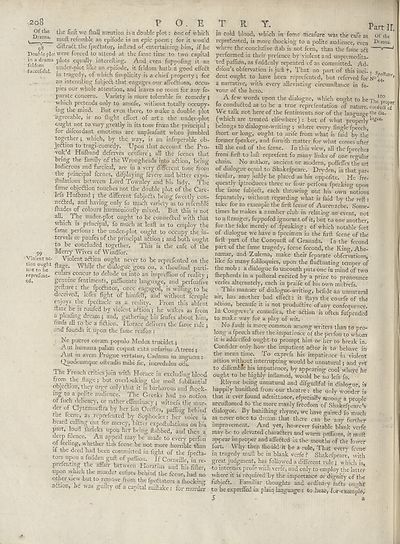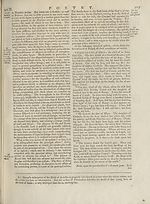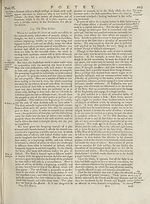Encyclopaedia Britannica > Volume 15, PLA-RAM
(246) Page 208
Download files
Complete book:
Individual page:
Thumbnail gallery: Grid view | List view

208 F O. E
Of tlie die fir ft we fhall mention is a double plot: one of which
, 1 mull refemble an epifode in an epic poem ; for it would
9g di (tract the fpedtator, in (lead of entertaining him, if he
Double plot were forced to attend at the fame time to two capital
in a drama plots equally interefting. And even fuppofing it an
tu cchful under-pIot like an epifode, it feldom hath a good efl’ett
in tragedy, of which innplicity is a chief property ; for
an interelling fuhjeCt that engages our affections," occu¬
pies our whole attention, and leaves no room for any fe-
parate concern. Variety is more tolerable fn comedy;
which pretends only to amufe, without totally occupy¬
ing the mind. But even there, to make a double plot
agreeable, is no (light effort of art: the under-plot
ought not to vary greatly in its tone from the principal;
for difcordant emotions are unpleafaflt when jumbled
together; which, by the way, is an infuperable ob¬
jection to tragi-comedy. Upon that account the Pro¬
vok’d Hufband deferves cenfure; all the feenes that
bring the family of the Wrongheads into aCtion, being
ludicrous and farcical, are in a very different tone from
the principal feenes, diiplaying fevere and bitter expo-
Itillations between Lord Townley and his lady. The
fame objection touches not the double plot of the Care-
lefs Hufband ; the different fubjeCts being fweetly con¬
nected, and having only fo much variety as to referable
fhades of colours harmonioufly mixed. But this is not
all.. I he under-plot ought to be connected with that
which is principal, fo much at lealt as to employ the
fame perlons: the under-plot ought to occupy the in¬
tervals or paufes of the principal aCtion ; and both ought
to be concluded together. This is the cafe of the
99 Merry Wives of Windfor.
Violent ac- Violent aCtion ought never to be reprefented on the
not^be fta&e* WhiIe the d^logue goes on, a thoufand parti-
reprefent- Cldars concur to delude us into an impreffion of reality ;
ed. genuine fentiments, paffionate language, and perfuafive
gefture: the fpeCtator, once engaged, is willing to be
deceived, lofes fight of himfelf, and without fcruple
enjoys the fpeCtacle as a reality. Prom this abfent
(late he is roufed by violent aCtion ; he wakes as from
a pleating dream; and, gathering his fenfes about him,
hnds all to be a fiction. Horace delivers the fame rule;
and founds it Upon the fame reafon :
Ne pueros coram populo Medea trucidet;
Aut humana palam coquat exta nefanus Atreus;
^Vut m avem Progne vertatur, Cadmus in anguem:
Quodcumque oitendis mihi fie, increduhis odi.
The French critics join with Horace in excluding blood
from the (htge ; but overlooking the mod fubffantial
objection, they urge only that it is barbarous and fliock-
ing to a polite audience. The Greeks had no notion
of fuch delicacy, or rather effiminacy ; witnefs the mur¬
der of Clytemneltra by her fon Orcffes, paffrhg behind
tue feene, as leprefented by Sophocles : her voice is
heard calling out for mercy, bitter expoffulations on his
part, loud fhrieks upon her being (tabbed, and then a
deep filence. An appeal may be made to eveiy perfon
of feeling, whether this feene be not more horrible than
if the deed had been committed in fight of the fpeCta
tors upon a fodden guff of paffion. If Corneille, in re-
i prefentmg the affair between Horatms and his filler,
upon winch the murder enfues behind the feene, had no
other view but to remove from the fpeClators a (hocking
aCtion, he was guilty of a capital miilake : for murder
T It Y. Part ir.
in cold blood, which in fome meafure was the cafe as Of the
represented, is more (hocking to a polite audience, even Drania.
where the conclufive dab is not feen, than the fame aCt v J
performed in their prefence by violent and unpremedita¬
ted paffidn, as fuddenly repented of as committed. Ad-
difon’s obfertation is juft f. That no part of this inch i 9
dent ought to have been reprefented, but referved for
a narrative, with every alleviating circumftance in fa¬
vour of the hero.
A few words upon the dialogue, which ought to beThe0°
fo conducted as to be a true reprefentation of nature. condJeuT
We talk not here of the fentiments nor of the language t*le ^'a-
(which are treated elfewliere) : but of what properly
belongs to dialogue-writing ; where every fingle fpeech,
(hort or long, ought to arife from what is faid by the
former fpeaker, and furnilh matter for ivliat comes’after
till the end of the feene. In this view, all the fpeeches
from firft to laft reprefent fo many links of one regular
chain. No author, ancient or modern, poffeffes the art
of dialogue equal to Shakefpeare. Dryden, in that par¬
ticular,. may juftly be placed as his oppofite. He fre¬
quently introduces three or four perfons fpeaking upon
the fame fubject, each throwing out his own notions
feparately, without regarding what is faid by the reft :
take for an example the firft feene of Aurenzebe. Some¬
times he makes a number club in relating an event, not
to a ft ranger, fuppofed ignorant of it, but to one another,
for the fake merely of fpeaking : of which notable fort
of dialogue we have a fpecimen in the firft feene of the
firft part of the Conqueft of. Granada. In the fecond
part of the fame tragedy, feene fecond, the King, Abe-
namar, and Z ulema, make their feparate obfervations,
like fo many foliloquies, upon the fluctuating temper of
the mob : a dialogue fo uncouth puts one in mind of two
fhepheids in a pailoral excited by a prize to pronounce
verfes alternately, each in praife of his own miftrefs.
*1 his manner of dialogue-writing, befide an unnatural
air, has another bad effeCl: it (lays the courfe of the
action, becaufe it is not productive of any confequence.
In Congreve’s coinedits, the aCtien is often fufpended
to make way for a play of wit.
No fault is more common among writers than to pro*
long a fpeech after the impatience of the perfon to whom
it is addreffed ought to prompt him or her to break in.
Conflder only how the impatient aCtor is to behave in
toe mean tune. Fo exprefs his impatience in violent
a&ion without interrupting would be unnatural; and yet
to diflemble his impatience, by appearing coop where he
ought to be highly inflamed, would be no lefs fo.
Rhyme being unnatural and difguftful in dialogue, is
happily bamflied from our theatre : the only wonder is
that it ever found admittance, efpecially among a people
accuftomed to the more manly freedom' of ShaWpeare’s
dialogue. By banilhing rhyme, we have gained fo much
as never once to dream that there can be any further
improvement. And yet, however fuitable blank verfe
may be to elevated characters and warm pad ions, it muff
appear improper and affeCted in the mouths of the lower
fort. Why then (honld it be a rule, That every feene
in tragedy mud be in blank verfe ? Shakefpeare, with
great judgment, has followed a different rule ; which is,
to intermix profe with verfe, and only to employ the latter
where it is required by the importance or dignity of the
fubjeCt. Familiar thoughts and ordinary faCts oimht
to be expreffed in plain language : to hear," for-example,
5 a
Of tlie die fir ft we fhall mention is a double plot: one of which
, 1 mull refemble an epifode in an epic poem ; for it would
9g di (tract the fpedtator, in (lead of entertaining him, if he
Double plot were forced to attend at the fame time to two capital
in a drama plots equally interefting. And even fuppofing it an
tu cchful under-pIot like an epifode, it feldom hath a good efl’ett
in tragedy, of which innplicity is a chief property ; for
an interelling fuhjeCt that engages our affections," occu¬
pies our whole attention, and leaves no room for any fe-
parate concern. Variety is more tolerable fn comedy;
which pretends only to amufe, without totally occupy¬
ing the mind. But even there, to make a double plot
agreeable, is no (light effort of art: the under-plot
ought not to vary greatly in its tone from the principal;
for difcordant emotions are unpleafaflt when jumbled
together; which, by the way, is an infuperable ob¬
jection to tragi-comedy. Upon that account the Pro¬
vok’d Hufband deferves cenfure; all the feenes that
bring the family of the Wrongheads into aCtion, being
ludicrous and farcical, are in a very different tone from
the principal feenes, diiplaying fevere and bitter expo-
Itillations between Lord Townley and his lady. The
fame objection touches not the double plot of the Care-
lefs Hufband ; the different fubjeCts being fweetly con¬
nected, and having only fo much variety as to referable
fhades of colours harmonioufly mixed. But this is not
all.. I he under-plot ought to be connected with that
which is principal, fo much at lealt as to employ the
fame perlons: the under-plot ought to occupy the in¬
tervals or paufes of the principal aCtion ; and both ought
to be concluded together. This is the cafe of the
99 Merry Wives of Windfor.
Violent ac- Violent aCtion ought never to be reprefented on the
not^be fta&e* WhiIe the d^logue goes on, a thoufand parti-
reprefent- Cldars concur to delude us into an impreffion of reality ;
ed. genuine fentiments, paffionate language, and perfuafive
gefture: the fpeCtator, once engaged, is willing to be
deceived, lofes fight of himfelf, and without fcruple
enjoys the fpeCtacle as a reality. Prom this abfent
(late he is roufed by violent aCtion ; he wakes as from
a pleating dream; and, gathering his fenfes about him,
hnds all to be a fiction. Horace delivers the fame rule;
and founds it Upon the fame reafon :
Ne pueros coram populo Medea trucidet;
Aut humana palam coquat exta nefanus Atreus;
^Vut m avem Progne vertatur, Cadmus in anguem:
Quodcumque oitendis mihi fie, increduhis odi.
The French critics join with Horace in excluding blood
from the (htge ; but overlooking the mod fubffantial
objection, they urge only that it is barbarous and fliock-
ing to a polite audience. The Greeks had no notion
of fuch delicacy, or rather effiminacy ; witnefs the mur¬
der of Clytemneltra by her fon Orcffes, paffrhg behind
tue feene, as leprefented by Sophocles : her voice is
heard calling out for mercy, bitter expoffulations on his
part, loud fhrieks upon her being (tabbed, and then a
deep filence. An appeal may be made to eveiy perfon
of feeling, whether this feene be not more horrible than
if the deed had been committed in fight of the fpeCta
tors upon a fodden guff of paffion. If Corneille, in re-
i prefentmg the affair between Horatms and his filler,
upon winch the murder enfues behind the feene, had no
other view but to remove from the fpeClators a (hocking
aCtion, he was guilty of a capital miilake : for murder
T It Y. Part ir.
in cold blood, which in fome meafure was the cafe as Of the
represented, is more (hocking to a polite audience, even Drania.
where the conclufive dab is not feen, than the fame aCt v J
performed in their prefence by violent and unpremedita¬
ted paffidn, as fuddenly repented of as committed. Ad-
difon’s obfertation is juft f. That no part of this inch i 9
dent ought to have been reprefented, but referved for
a narrative, with every alleviating circumftance in fa¬
vour of the hero.
A few words upon the dialogue, which ought to beThe0°
fo conducted as to be a true reprefentation of nature. condJeuT
We talk not here of the fentiments nor of the language t*le ^'a-
(which are treated elfewliere) : but of what properly
belongs to dialogue-writing ; where every fingle fpeech,
(hort or long, ought to arife from what is faid by the
former fpeaker, and furnilh matter for ivliat comes’after
till the end of the feene. In this view, all the fpeeches
from firft to laft reprefent fo many links of one regular
chain. No author, ancient or modern, poffeffes the art
of dialogue equal to Shakefpeare. Dryden, in that par¬
ticular,. may juftly be placed as his oppofite. He fre¬
quently introduces three or four perfons fpeaking upon
the fame fubject, each throwing out his own notions
feparately, without regarding what is faid by the reft :
take for an example the firft feene of Aurenzebe. Some¬
times he makes a number club in relating an event, not
to a ft ranger, fuppofed ignorant of it, but to one another,
for the fake merely of fpeaking : of which notable fort
of dialogue we have a fpecimen in the firft feene of the
firft part of the Conqueft of. Granada. In the fecond
part of the fame tragedy, feene fecond, the King, Abe-
namar, and Z ulema, make their feparate obfervations,
like fo many foliloquies, upon the fluctuating temper of
the mob : a dialogue fo uncouth puts one in mind of two
fhepheids in a pailoral excited by a prize to pronounce
verfes alternately, each in praife of his own miftrefs.
*1 his manner of dialogue-writing, befide an unnatural
air, has another bad effeCl: it (lays the courfe of the
action, becaufe it is not productive of any confequence.
In Congreve’s coinedits, the aCtien is often fufpended
to make way for a play of wit.
No fault is more common among writers than to pro*
long a fpeech after the impatience of the perfon to whom
it is addreffed ought to prompt him or her to break in.
Conflder only how the impatient aCtor is to behave in
toe mean tune. Fo exprefs his impatience in violent
a&ion without interrupting would be unnatural; and yet
to diflemble his impatience, by appearing coop where he
ought to be highly inflamed, would be no lefs fo.
Rhyme being unnatural and difguftful in dialogue, is
happily bamflied from our theatre : the only wonder is
that it ever found admittance, efpecially among a people
accuftomed to the more manly freedom' of ShaWpeare’s
dialogue. By banilhing rhyme, we have gained fo much
as never once to dream that there can be any further
improvement. And yet, however fuitable blank verfe
may be to elevated characters and warm pad ions, it muff
appear improper and affeCted in the mouths of the lower
fort. Why then (honld it be a rule, That every feene
in tragedy mud be in blank verfe ? Shakefpeare, with
great judgment, has followed a different rule ; which is,
to intermix profe with verfe, and only to employ the latter
where it is required by the importance or dignity of the
fubjeCt. Familiar thoughts and ordinary faCts oimht
to be expreffed in plain language : to hear," for-example,
5 a
Set display mode to:
![]() Universal Viewer |
Universal Viewer | ![]() Mirador |
Large image | Transcription
Mirador |
Large image | Transcription
Images and transcriptions on this page, including medium image downloads, may be used under the Creative Commons Attribution 4.0 International Licence unless otherwise stated. ![]()
| Encyclopaedia Britannica > Encyclopaedia Britannica > Volume 15, PLA-RAM > (246) Page 208 |
|---|
| Permanent URL | https://digital.nls.uk/191903974 |
|---|
| Attribution and copyright: |
|
|---|
| Description | Ten editions of 'Encyclopaedia Britannica', issued from 1768-1903, in 231 volumes. Originally issued in 100 weekly parts (3 volumes) between 1768 and 1771 by publishers: Colin Macfarquhar and Andrew Bell (Edinburgh); editor: William Smellie: engraver: Andrew Bell. Expanded editions in the 19th century featured more volumes and contributions from leading experts in their fields. Managed and published in Edinburgh up to the 9th edition (25 volumes, from 1875-1889); the 10th edition (1902-1903) re-issued the 9th edition, with 11 supplementary volumes. |
|---|---|
| Additional NLS resources: |
|

